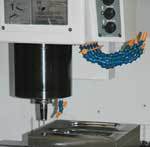Hydraulic Fluid Reduces Energy Consumption by Eight Percent
An energy-efficient hydraulic fluid has been developed for use with CNC machines that features low-deposit forming tendencies, provides equipment protection and can extend oil maintenance intervals.
An energy-efficient hydraulic fluid has been developed for use with CNC machines that features low-deposit forming tendencies, provides equipment protection and can extend oil maintenance intervals.
Shell Tellus EE, developed by Shell Lubricants (Houston, TX)—a provider of lubricants technology solutions—can help companies save an average of 8 percent on energy consumption. Purchasing personnel and/or maintenance engineers should take note that, according to Shell Hydraulics Product Application Specialist Dennis Woodley, this lubricant has been specifically designed to help improve the energy efficiency of the machinery in which it is used.
“The fluid contains a unique and patented additive technology, and has undergone extensive laboratory tests and field trials that have demonstrated its ability to help improve a machine’s energy efficiency,” Woodley explains. “With hydraulics being at the core of many production processes, Shell Tellus EE has the potential to contribute to the goal of reducing a company’s energy costs.”
How It Works
While some companies focus on individual elements of a hydraulic system when designing their lubricants, Shell Lubricants has used sophisticated fluid mechanics modeling to understand the different sources of energy loss in the system as a whole, Woodley notes. This information has then been used to help to develop a fluid with a balance of physical and chemical properties that can help reduce energy loss throughout the system without compromising the protection and long equipment life expected by its users.
“When developing this fluid, it was essential that the lubricant’s ability to contribute toward a machine’s energy efficiency be combined with high-performance characteristics,” Woodley comments. “For example, Shell Tellus EE exceeds the maximum test duration of 10,000 hours in the industry TOST (Turbine Oil Stability) test used to assess the oil life of hydraulic fluids, as well as demonstrates wear levels in hydraulic pump tests way below the levels often set by industry standards or certain OEM limits.”
Additionally, the fluid has superior air release properties—releasing trapped air up to 95 percent faster than required by industry specs, which helps to minimize the effective compressibility of fluid for improved transmission of power. Woodley explains, “This also helps to control oxidation, which leads to longer oil life and protection against soot and particles.”
It is also recommended that one follow the machine tool manufacturer’s recommendation when selecting the most appropriate hydraulic fluid—especially if the machine is under warranty.
Using this fluid will protect your shop’s machinery. Woodley explains, “If the fluid is too thick, your machinery will use too much energy; however, a thin fluid may not provide the necessary protection to help keep your system running for the optimum amount of time. Wear protection is crucial when trying to attain fewer breakdowns and avoid the high cost of repairs, and this energy-efficient hydraulic fluid's unique additive technology is formulated to help deliver the best protection against hydraulic pump wear and hence help increase the service life of your system.”
Related Content
-
How to Use Continuing Education to Remain Competitive in Moldmaking
Continued training helps moldmakers make tooling decisions and properly use the latest cutting tool to efficiently machine high-quality molds.
-
How to Overcome Deep-Hole Drilling Obstacles in Mold Machining
Keep up with the newest tooling innovations to overcome holemaking and finishing challenges.
-
How a Small Programming Change Cuts Cycle Time in Half
Overriding the CAM system when milling a series of lifter pockets helps to improve metal removal rate and increase feed rates.















